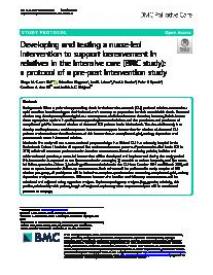Developing and testing a nurse-led intervention to support bereavement in relatives in the intensive care (BRIC study) : a protocol of a pre-post intervention study
Background
When a patient is approaching death in the intensive care unit (ICU), patients’ relatives must make a rapid transition from focusing on their beloved one’s recovery to preparation for their unavoidable death. Bereaved relatives may develop complicated grief as a consequence of this burdensome situation; however, little is known about appropriate options in quality care supporting bereaved relatives and the prevalence and predictors of complicated grief in bereaved relatives of deceased ICU patients in the Netherlands. The aim of this study is to develop and implement a multicomponent bereavement support intervention for relatives of deceased ICU patients and to evaluate the effectiveness of this intervention on complicated grief, anxiety, depression and posttraumatic stress in bereaved relatives.
Methods
The study will use a cross-sectional pre-post design in a 38-bed ICU in a university hospital in the Netherlands. Cohort 1 includes all reported first and second contact persons of patients who died in the ICU in 2018, which will serve as a pre-intervention baseline measurement. Based on existing policies, facilities and evidence-based practices, a nurse-led intervention will be developed and implemented during the study period. This intervention is expected to use 1) communication strategies, 2) materials to make a keepsake, and 3) a nurse-led follow-up service. Cohort 2, including all bereaved relatives in the ICU from October 2019 until March 2020, will serve as a post-intervention follow-up measurement. Both cohorts will be performed in study samples of 200 relatives per group, all participants will be invited to complete questionnaires measuring complicated grief, anxiety, depression and posttraumatic stress. Differences between the baseline and follow-up measurements will be calculated and adjusted using regression analyses. Exploratory subgroup analyses (e.g., gender, ethnicity, risk profiles, relationship with patient, length of stay) and exploratory dose response analyses will be conducted.
Discussion
The newly developed intervention has the potential to improve the bereavement process of the relatives of deceased ICU patients. Therefore, symptoms of grief and mental health problems such as depression, anxiety and posttraumatic stress, might decrease.
Trial registration
Netherlands Trial Register Registered on 27/07/2019 as NL 7875, www.trialregister.nl
In: BMC Palliative Care ; ISSN: 1472-684X | 19 | august | 130
https://bmcpalliatcare.biomedcentral.com/articles/10.1186/s12904-020-00636-8
Open Access


